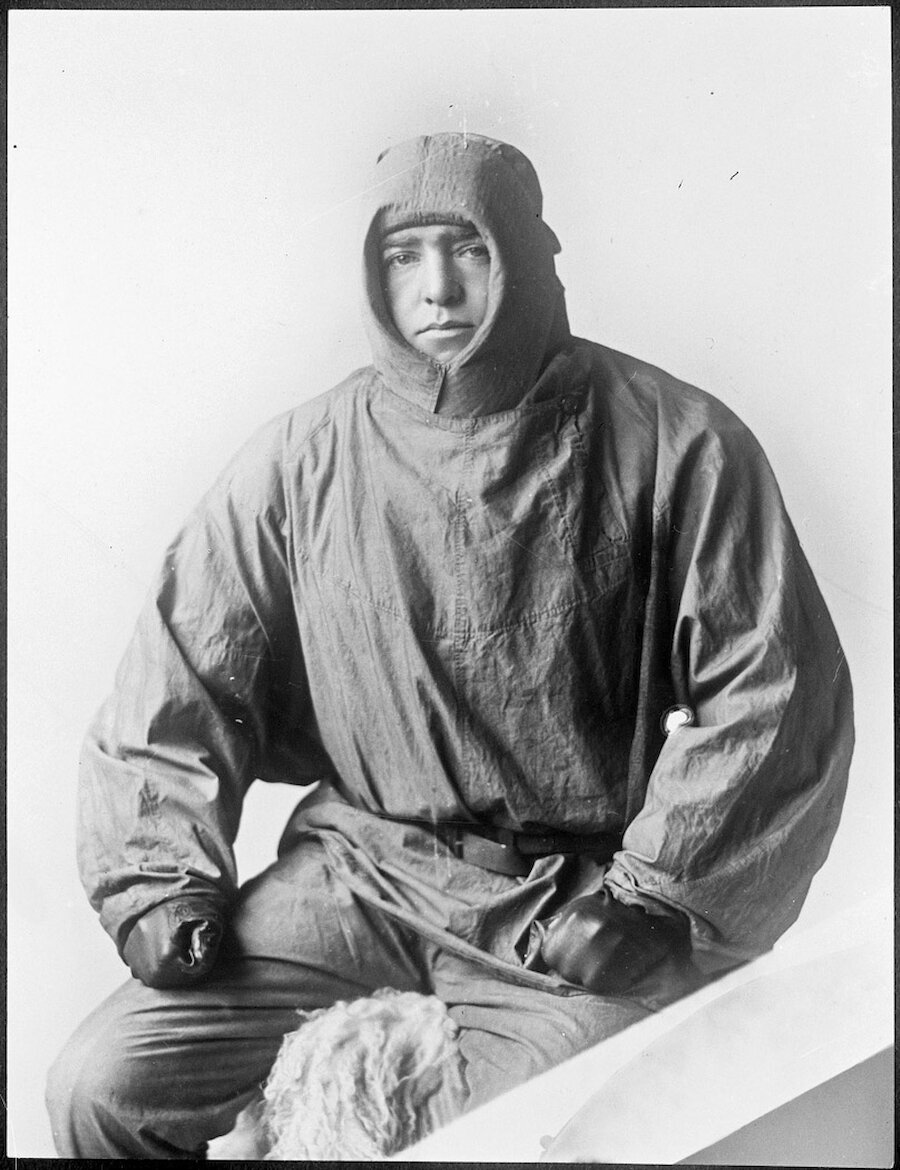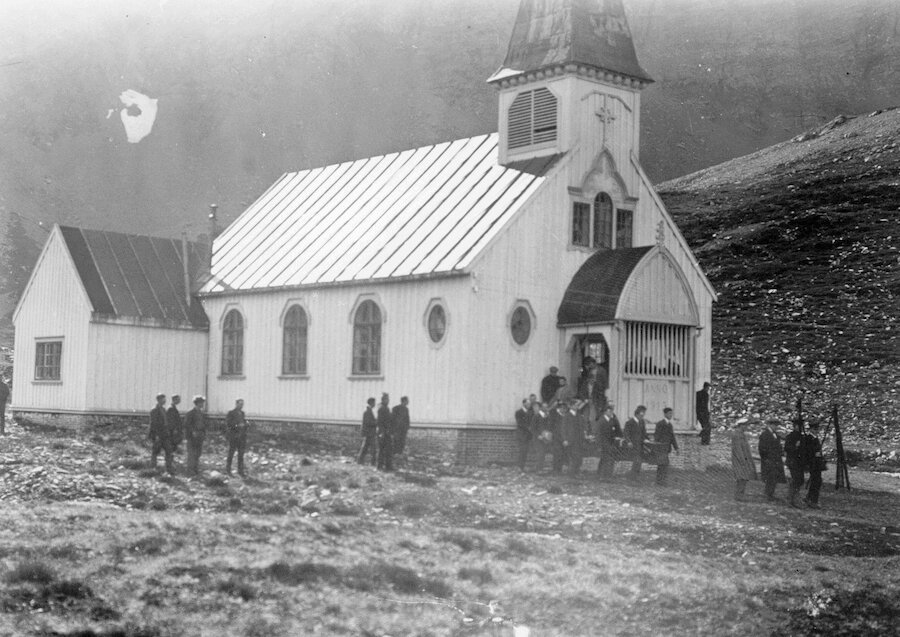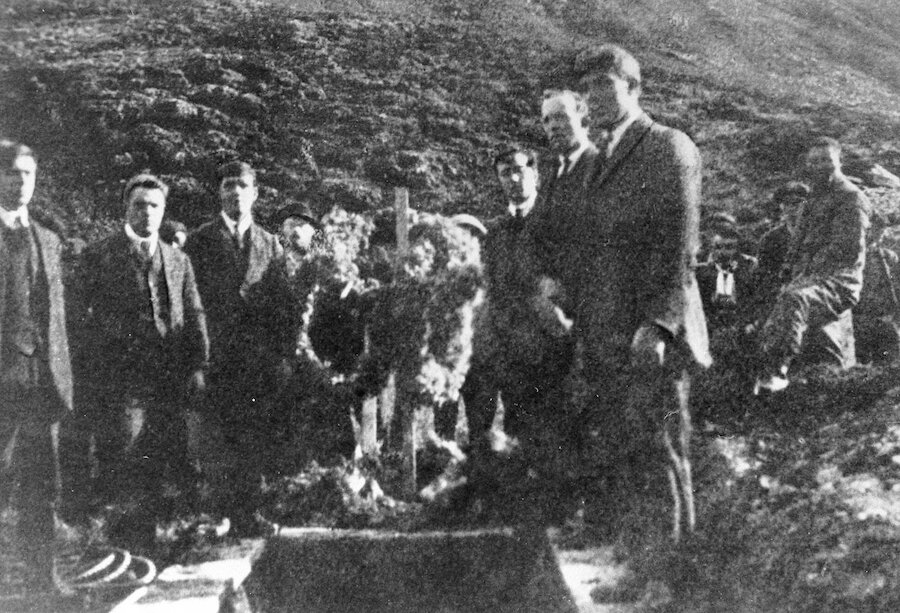The pallbearers
All the pallbearers worked within the fishing industry before the First World War. Fishing in the early 20th century had declined with onset of war and this continued after the war with fewer people being employed and the amount and value of the catch variable. This had a devastating impact on the Shetland salt herring industry. Many men arrived home from war to a changed local economic and social environment, with scarce employment. This forced many Shetlanders to move to where the work was and whaling seemed a sensible option.
The South Georgia and Shetland connection is closely linked through whaling. Antarctic whaling took hold following the decline in whale stocks in the North Sea around Britain, Iceland and Norway. It had been important to the Shetland economy for many years. For these men, setting forth to the whaling during the winter months in South Georgia in the South Atlantic, between 1921 and 1922, was an economic necessity. Some of these Shetland men had been coopers before the war, a trade that was needed at whaling stations.
It was for this reason that a group of Shetlanders happened to be in South Georgia the time of Shackleton's death. His pallbearers were:
James Brown
Known locally as “Sodger” Brown he served with 2/Royal Scots. He saw action at Mons in August 1914 and was an “Old Contemptible”, those that had served from 1914 and throughout the war. He was awarded the Mons Star and Bar, and twice wounded. Following discharge from army, he served on Ambitious, a hired drifter. During WWII, James joined the Royal Engineers, after being turned down for the Home Guard on account of his age. He was on operations at Le Havre docks where he witnessed evacuation of troops in 1940, as part of Operation Aerial. James passed away in Swansea, on 17 June, 1966. At his funeral, floral tributes were sent by the local Royal British Legion.
John Bryne
Enlisted as a seaman with the Royal Naval Reserve in 1916, having previously served with the Gordon Highlanders. He served with HMS Brilliant shore staff, a depot ship for trawlers and patrol boats of the Auxiliary patrol, then later on Ambitious, until his discharge in December 1919. After the war he was a baker and the town lamp lighter. John died on 16 August 1959, aged 72.
James Leask
Originating from Lochside, Lerwick, James worked as a fishworker. In August 1914 he enrolled as a seaman with the Royal Naval Reserve serving on an X-Class Motor Lighter, a shallow craft used for landing, as well as water and fuel tankers. James passed away on 30 June 1984.
Magnus Leask
Magnus was employed as a fishworker before he enlisted as a seaman with HMS Thalia depot ship, a parent ship for boats of the Auxiliary Patrol, Cromarty and Peterhead. He served the Royal Naval Reserve as a gunner on hired drifter HMS Moniadhla. Following the war, Magnus was a crofter. In the 1970s, Shackleton's son visited Shetland and was presented with a photograph of the burial by Magnus. He passed away in Lerwick on 24 March 1987.
George Manson
Originating from Hamnavoe, Burra, George resided at 14 Burgess Street. In November 1914, he enrolled as a seaman with the Royal Naval Reserve. He demobilised in March 1919 with rank as “Gunner”. He passed away on 13 April 1957.
William Sandison.
From Freefield, Lerwick, William was one of over 200 Shetland Territorials who left Shetland in June 1915. Prior to the war, he was a cooper at Slaters barrel factory in Lerwick. He saw action with the 7th Battalion Gordon Highlanders on the Western Front throughout 1915-1918, on the Somme, Cambrai and was wounded during the German Offensive of March 1918, obtaining a Military Medal. Although wounded, he served on the Italian front, looking after prisoners of war. Following WWII, William again returned to working in whaling. A passport photograph of him – aged 47 – was taken at Leith on 17 October 1945 en route once more to the whaling stations on South Georgia. Like whaling families, his wife and son would not see him throughout the winter.
Shackleton was a great man, carried to his final resting place by six ordinary, humble Shetlanders. There was to be a further addition to this story. Some of these pallbearers played a football match against the crew of the Quest, upon their return to South Georgia following their expedition.


